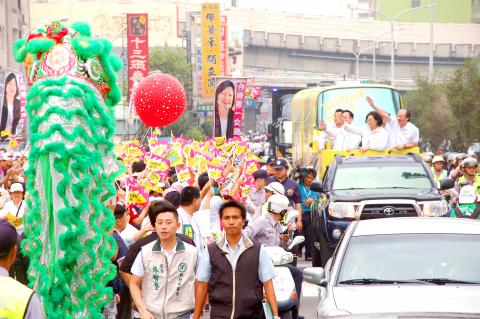As Democratic Progressive Party (DPP) Chairperson Tsai Ing-wen’s (蔡英文) presidential election campaign trip took her to areas with heavy Hakka populations in northern Taiwan yesterday, the party said it feels that it has never had as good an opportunity as this year to make strides in securing Hakka votes in the election.
One of the main reasons for that confidence is that, unlike previous standard-bearers, Tsai is of Hakka descent.
Tsai said yesterday in Hsinchu, one of the three main Hakka constituencies in northern Taiwan, along with Miaoli and Taoyuan, that her party planned to promote the Hakka language and eventually designate it as one of the national languages if she were elected president in January.

Photo: Wang Chin-yi, Taipei Times
Her 11-day campaign trip along the west coast was approaching Taipei, where the trip will draw to a close today.
“After a successful campaign in southern Taiwan, people said that I would receive a lukewarm welcome as the group traveled northward, but I haven’t felt that,” Tsai told supporters on a campaign stop at Jhongli (中壢), Taoyuan County.
Hakka are the second-largest ethnic group in Taiwan behind Hoklo. According to a Council of Hakka Affairs survey, 18.1 percent of the nation’s 23 million nationals, or 4.2 million people, are of Hakka descent.
In past elections, most Hakka in northern Taiwan favored the Chinese Nationalist Party (KMT). A recent DPP survey shows that it trails by about 10 percent among Hakka voters in that region.
While Hakka communities in southern Taiwan’s Pingtung and Kaohsiung gave Tsai and her running mate Su Jia-chyuan (蘇嘉全) a warm welcome last week because the pair hail from Pingtung, the DPP understood that winning Hakka votes in the north would be a tall order.
Tsai said that the DPP has long been seen as a party dominated by Hoklo people, which was why it has not been successful in Hakka constituencies in the past.
However, that was probably a wrong perception, because Hoklo people and the DPP neither ignore nor discriminate against the Hakka, Tsai said.
Speaking in Hsinchu yesterday, Tsai said the Council of Hakka Affairs and the Hakka TV Service were both founded between 2000 and 2008, when the DPP was in power. The DPP administration also helped several universities establish Colleges of Hakka Studies, she added.
Being a Hakka, Tsai said she would like to do more to promote the Hakka language and culture as well as improving infrastructure in Hakka constituencies.
Earlier in Miaoli, she talked about reviving local economies by developing industries with local characteristics, such as wood carving. In Hsinchu, she pledged to make the region, which is already known as Taiwan’s Silicon Valley, the technology capitol of Taiwan by expanding the size and diversity of the Hsinchu Science Park.
Although Tsai does not speak fluent Hakka, Hakka people seemed to see her as one of their own, DPP legislative candidate Yang Yiong Cong-ziin (楊長鎮) said.
“It appeared that Hakka women — young and old — felt that they could identify with Tsai and they believe in her, and maybe that could make a difference in the election,” said a Tsai campaign adviser, who wished to remain anonymous because he was not authorized to speak on the matter.
The DPP see the Hakka constituencies as important battlegrounds, with former Hsinchu County commissioner Lin Kwang-hua (林光華), a Hakka, saying that Taoyuan, Hsinchu and Miaoli could be the deciding electoral region of January’s presidential election, despite widespread belief that central Taiwan would be the game-changer.

Taiwan is stepping up plans to create self-sufficient supply chains for combat drones and increase foreign orders from the US to counter China’s numerical superiority, a defense official said on Saturday. Commenting on condition of anonymity, the official said the nation’s armed forces are in agreement with US Admiral Samuel Paparo’s assessment that Taiwan’s military must be prepared to turn the nation’s waters into a “hellscape” for the Chinese People’s Liberation Army (PLA). Paparo, the commander of the US Indo-Pacific Command, reiterated the concept during a Congressional hearing in Washington on Wednesday. He first coined the term in a security conference last

Prosecutors today declined to say who was questioned regarding alleged forgery on petitions to recall Democratic Progressive Party (DPP) legislators, after Chinese-language media earlier reported that members of the Chinese Nationalist Party (KMT) Youth League were brought in for questioning. The Ministry of Justice Investigation Bureau confirmed that two people had been questioned, but did not disclose any further information about the ongoing investigation. KMT Youth League members Lee Hsiao-liang (李孝亮) and Liu Szu-yin (劉思吟) — who are leading the effort to recall DPP caucus chief executive Rosalia Wu (吳思瑤) and Legislator Wu Pei-yi (吳沛憶) — both posted on Facebook saying: “I

Sung Chien-liang (宋建樑), who led efforts to recall Democratic Progressive Party (DPP) Legislator Lee Kun-cheng (李坤城), was released on bail of NT$80,000 today amid outcry over his decision to wear a Nazi armband to questioning the night before. Sung arrived at the New Taipei District Prosecutors’ Office for questioning in a recall petition forgery case last night wearing a red armband bearing a swastika, carrying a copy of Adolf Hitler’s Mein Kampf and giving a Nazi salute. Sung left the building at 1:15am without the armband and covering the book with his coat. Lee said today that this is a serious

Firefighters are working to put out a fire on Taipei’s Yangmingshan (陽明山) reported earlier this morning. The cause of the fire is still under investigation. The Taipei Fire Department said it received a report of a fire at Xiaoyoukeng (小油坑) at 11:17am, dispatching four command vehicles, 16 firetrucks, one ambulance and 72 personnel. The fire is still burning on about 250m² of land, according to initial estimates, as eyewitnesses reported seeing smoke rising from the mountain. The Yangmingshan National Park Headquarters on Facebook said the Qixingshan (七星山) hiking trail starting from Xiaoyoukeng and the Xiaoyoukeng parking lot are closed as firefighters work to put